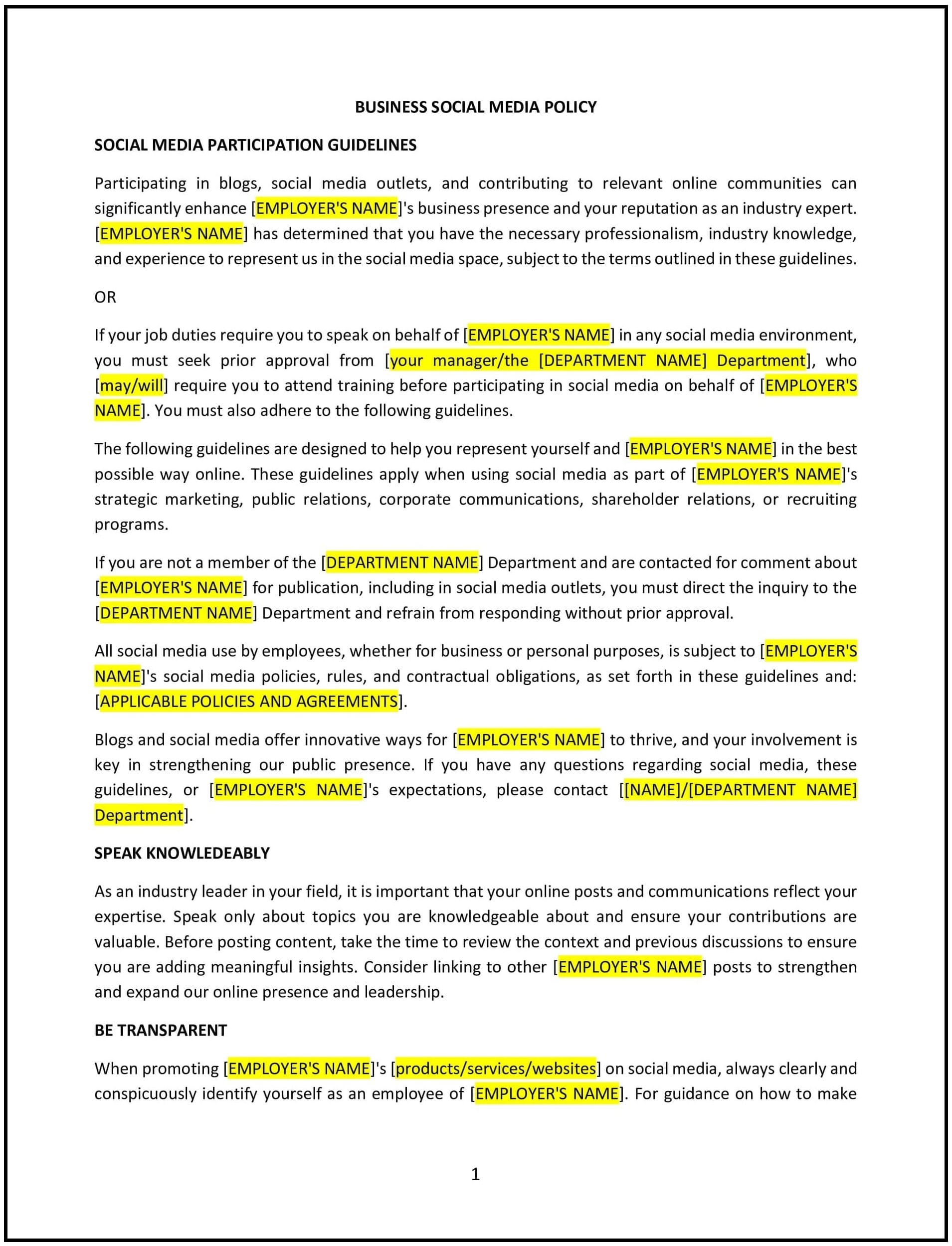Business social media policy (Massachusetts): Free template
Got contracts to review? While you're here for policies, let Cobrief make contract review effortless—start your free review now.

Customize this template for free
This business social media policy is designed to help Massachusetts businesses establish guidelines for employees' use of social media, both in and outside of the workplace. The policy aims to protect the company’s reputation, ensure compliance with relevant state and federal regulations, and provide guidance on appropriate social media conduct while promoting a positive online presence.
By adopting this policy, businesses can foster a responsible, respectful, and professional online environment, reducing the risk of damage to the company’s brand and preventing potential legal or ethical issues arising from employees’ social media activities.
How to use this business social media policy (Massachusetts)
- Define acceptable social media use: Clearly outline the types of social media activities that are appropriate during work hours, including the use of platforms like LinkedIn, Facebook, Twitter, and others. The policy should specify whether employees are permitted to use social media for business-related purposes and whether personal use is allowed during work hours.
- Set expectations for professional conduct: Emphasize that employees must conduct themselves professionally online, both during and outside of working hours. The policy should specify that employees should avoid posting content that could reflect negatively on the company, such as inappropriate language, discriminatory remarks, or controversial opinions.
- Address company representation: Specify that employees should not represent the company on social media unless authorized. When employees post content related to their job or industry, they should make it clear that their opinions are their own and not representative of the company’s views.
- Protect confidential information: Outline the importance of protecting the company’s confidential and proprietary information. Employees should be prohibited from posting sensitive company data, client information, or trade secrets on social media.
- Specify personal social media activity: Clarify that personal use of social media should not interfere with job performance and should not be conducted using company time or resources. Employees should also avoid using company branding or logos on personal social media accounts unless permitted.
- Address employee interactions with customers: Establish clear guidelines for employees interacting with customers or clients on social media. The policy should specify whether employees are allowed to respond to customer queries, provide customer service, or engage in promotional activities on behalf of the company via social media.
- Set consequences for policy violations: Clearly define the consequences for violating the social media policy, which may include disciplinary action, up to and including termination, depending on the severity of the violation.
- Ensure compliance with Massachusetts and federal laws: Ensure that the policy complies with relevant Massachusetts state laws and federal regulations, including those related to privacy, discrimination, and workplace protections, such as the National Labor Relations Act (NLRA), which protects employees’ rights to discuss working conditions online.
Benefits of using this business social media policy (Massachusetts)
This policy offers several benefits for Massachusetts businesses:
- Protects the company’s reputation: By setting clear boundaries for employees’ social media conduct, businesses can reduce the risk of online actions that could harm the company’s reputation or brand.
- Promotes responsible online behavior: Employees will have clear guidance on how to represent themselves and the company responsibly on social media, which helps to maintain a positive and professional online presence.
- Enhances employee accountability: The policy helps employees understand their responsibilities when engaging in social media activities, both at work and during personal time.
- Prevents legal and ethical issues: By addressing issues like confidentiality, discrimination, and inappropriate behavior, the policy helps mitigate the risk of legal disputes arising from social media use.
- Supports a positive workplace culture: A clear social media policy can encourage employees to use social media responsibly and positively, contributing to a healthy work environment and promoting the company’s values.
- Ensures compliance with laws: The policy ensures compliance with Massachusetts state laws and federal regulations governing social media use in the workplace, protecting the company from potential legal liabilities.
Tips for using this business social media policy (Massachusetts)
- Communicate the policy clearly: Ensure all employees are informed about the business social media policy and its expectations. This can be done through employee handbooks, orientation, and regular communication.
- Offer training: Provide employees with training on how to use social media responsibly, including guidelines for professional conduct and protecting company information.
- Monitor social media use: Regularly monitor employees’ social media activity to ensure compliance with the policy, especially in roles that require interaction with customers or the public.
- Address concerns promptly: If an employee’s social media activity raises concerns, address the issue promptly to prevent reputational damage or legal problems.
- Review and update regularly: Periodically review and update the policy to keep up with evolving social media platforms, changes in legal regulations, and the company’s business needs.